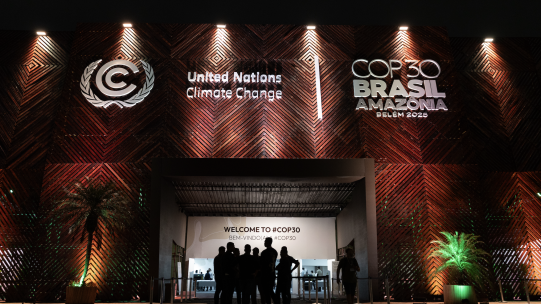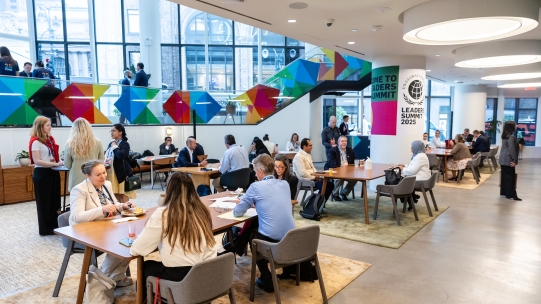Taking climate action is good for business
Read more

Climate change is disrupting lives, economies and ecosystems, and business has a part to play in both mitigating effects and creating opportunities.
Climate change refers to long-term shifts in temperatures and weather patterns, which have been significantly accelerated by human activities such as the burning of fossil fuels like coal, oil and gas.
The consequences of climate change include intense droughts, water scarcity, severe fires, rising sea levels, flooding, melting polar ice, catastrophic storms and declining biodiversity. Climate change disproportionately impacts those who have contributed the least to it — including communities in the Global South, women, youth, Indigenous Peoples and marginalized groups — who are often hit hardest by disasters driven by rising temperatures and increasingly volatile weather patterns. Climate change can affect our health, ability to grow food, housing, safety and work, influencing all systems, including business. For companies, it carries both immense risks and opportunities.
The risks are real for business: extreme weather events and resource shortages can disrupt supply chains, damage infrastructure and drive up costs. Energy instability from heatwaves and grid strain further impacts operations, while labour productivity declines under extreme heat and unsafe conditions. Companies also face financial and market risks from reduced investor confidence, as well as reputational risks such as loss of consumer trust.
The opportunities are just as significant: companies that invest in clean energy and reduce emissions can drive innovation, cut costs, enter new markets, attract investment and stay ahead of regulation.
In his recent remarks on climate action, “A Moment of Opportunity," the Secretary-General highlighted that over 90 per cent of new renewable energy projects worldwide generated electricity at a lower cost than the cheapest new fossil fuel alternative. This is also a major opportunity for job creation, as every dollar invested in renewable energy creates three times more jobs than in the fossil fuel industry.
The UN Global Compact has observed first-hand that business is aligned with this transition and stands ready to support it. In the CEO Study of the UN Global Compact conducted in partnership with Accenture, 88 per cent of interviewed CEOs said the business case for sustainability is stronger today than it was five years ago, and 99 per cent plan to maintain or expand their companies’ climate, environmental and social commitments.
Climate action benefits people and the planet — and since business is integral to both, it ultimately strengthens business resilience and success.

What is climate action?
There are two main types of climate action: mitigation and adaptation.
Mitigation refers to actions that reduce or prevent greenhouse gases. For a business, this can mean investing in renewable energy or embracing a circular economy. It can also involve setting science-based targets, showing companies that these targets not only provide a clear path to reduce their GHG emissions in line with climate science, but can also boost investor confidence, improve financial performance and mitigate risk and economic volatility.
Adaptation refers to adjusting to current and projected climate impacts to reduce community loss and damage. This can include investing in nature-based solutions or strengthening infrastructure and resilience against extreme weather.
From commitments to action
2025 marks the year that countries must submit their updated Nationally Determined Contributions (NDCs), outlining climate action through 2035 aimed toward achieving the goals of the Paris Agreement. These NDCs are ambitious national transition plans aimed at reducing emissions and building climate resilience within each country. Business plays a critical role in responding to these NDCs with corporate transition plans and 1.5°C-aligned solutions.
Achieving the 1.5°C pathway, enshrined in the 2015 Paris Agreement adopted at COP21, means keeping long-term temperature change below the threshold scientists identify as critical to avoiding the most severe impacts of climate change. Reaching this goal requires drastic emissions cuts aligned with the 1.5°C target to achieve net zero.
Doing so will require a fundamental transformation in how the world produces, consumes and invests.
Business has a vital role to play in driving this shift
By developing low-carbon technologies, investing in clean energy and resilient infrastructure, and collaborating across value chains to cut emissions at scale, business has a unique opportunity to work across sectors and help deliver on these goals.
Taking action on climate change is not only the responsible choice — it’s a strategic business imperative for long-term growth and stability while creating value for people, planet and business.


